The Nigerian Navy said it would cost about N1.2 billion yearly to keep one of its 25 warships on the sea, underscoring the severe funding challenge facing its operations.
The Flag Officer Commanding, Western Naval Command, Rear Admiral Gregory Oamen, said the Navy had acquired 21 new vessels in the past 10 years, with an average cost of N25.2 billion per year to put them to sea.
This comes as Nigeria pays about $400 million yearly on War Risk premiums to international insurers, with shipowners compelled to pay additional daily charges of between $1,000 and $2,000 once vessels cross five degrees east of Lagos waters.
Experts said this underscores the heavy financial burden on shipping and maritime trade in the country. This was stated yesterday at the third yearly maritime lecture of the Maritime Reporters Association of Nigeria (MARAN), themed: ‘Addressing the Burden of War Risk Insurance Surcharge on Nigerian Maritime Trade – A Case for Review’, held in Lagos.
Oamen, who was represented by the Commanding Officer of Nigerian Navy Ship (NNS) Thunder, Captain O.O. Oginni, said the Navy currently sustains only one vessel at sea per command, across its Western, Central and Eastern operational commands, a level of coverage he described as inadequate for Nigeria’s expansive maritime domain. He said inadequate logistics remain the Navy’s biggest constraint despite the Federal Government’s interventions in recent years.
“The ship I am commanding, NNS Thunder, has a full capacity of 891,000 litres. To put that ship to sea, it would cost the Navy about N1.2 billion just once in a year,” he explained.
Oamen disclosed that in 2022 alone, naval patrols at sea totaled 36,609 hours and 40 minutes, leading to the arrest of 191 suspects in 2022 and 80 in 2023 for maritime crimes. He noted that between 2015 and 2021, the Navy also handed over 333 vessels involved in infractions to relevant authorities, with several successful piracy prosecutions achieved under the SPOMO Act.
Oamen stated that Nigeria’s maritime sector is considered strategic, with a coastline of 420 nautical miles and an Exclusive Economic Zone of 84,000 square nautical miles, containing 37.2 billion barrels of crude oil reserves (2.92 per cent of global reserves) and 182 trillion cubic feet of gas reserves.
He said about 86 per cent of the nation’s external trade is conducted by sea, while oil and gas contribute 40 per cent of the gross domestic product (GDP) and 83 per cent of total revenue.
However, he said, with improved maritime security, weekly ship calls at Nigerian ports have increased from 123 in 2021 to 145 in 2023, while fishing GDP rose from N12 billion to N15 billion in the same period.
Oamen called for the establishment of a regular intervention fund to enable the Navy to maintain at least four vessels per command at sea daily, strengthen surveillance in Nigeria’s backwaters, and integrate new drones into its Falcon Eye and monitoring systems.
The former director-general of the Nigerian Maritime Administration and Safety Agency (NIMASA), Temisan Omatseye, explained that despite the successes recorded in keeping the country piracy-free, the War Risk premium, imposed by the London-based Joint War Risk Committee (JWC), applies to tankers and ships operating in Nigerian waters.






